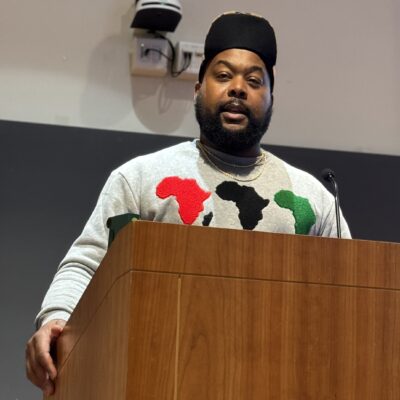Morton Encourages Mentors to Reflect on Power, Privilege

March 17, 2025
By Katya Hrichak
When serving as a mentor, it’s important to think about the influence of one’s power and privilege on mentor-mentee dynamics, according to Terrell Morton.
Morton, assistant professor of identity and justice in STEM education at the University of Illinois Chicago, gave the 2025 MAC Public Keynote on Mentoring within the Academy on Feb. 27, titled, “Lifting as You Climb: Accounting for Power and Privilege in the Mentoring of Early Career Professionals.”
“I think intentionally about mentoring early career professionals and how those of us who are engaged in the space of mentoring, either in our current moments or in our future moments, can consider the power and the privileges that we possess and how we leverage that in our mentoring spaces,” he said.
Morton shared how, in his research, he couples the frameworks of phenomenological variant ecological systems theory and critical race theory to consider how the interactions between external environments, policies, cultural norms, values, beliefs, practices, and assumptions shape the academic landscape. Through these examinations, he developed three key points for mentors to use to improve their mentoring relationships:
- “Check yourself before you wreck yourself,” Morton says, asks mentors to reflect on how they view not only their mentees, but themselves, and whether they take a holistic view of each or focus on certain actions, characteristics, or perspectives to the detriment of the mentoring relationship.
- Naming one’s own power and privilege, acknowledging where these identities might grant or limit opportunities, is also crucial.
- Take these powers and privileges and use them with an orientation to justice, helping others, including mentees, benefit from their positionality.
“We can be intentional to frame our approach that acknowledges systems and structures and sees [mentees] as humans, take bold and courageous decisions as we’re trying to support each other, then be the actual change that we want to see break that cycle,” Morton said.
Genetics, genomics, and development doctoral candidate Don Long said Morton’s first point resonated with him, leading to a reflection on internalized beliefs about who is or is not allowed to make mistakes based on privileges and identities.
“It’s extremely important for us (minoritized people) to be able to ‘drop a few balls’ out of the million that we may be juggling in order to practice self-care,” he said. “If we’re not able to sufficiently look after ourselves, ultimately we won’t be in a position to help others because we’re broken.”
Andrea Robinson, a doctoral candidate in nutrition, appreciated the way that Morton applied his frameworks to examine experiences in the academic landscape.
“Dr. Morton’s presentation made theory come alive and become personal, illuminating how our biases show up in interactions with the students we mentor,” she said. “He detailed how structural issues, specifically manifestations of anti-Blackness, show up in STEM education and how damaging it can be for Black students in STEM, a phenomenon I have personal experience with.”
The annual MAC Keynote on Mentoring within the Academy provides the Cornell community an opportunity to learn from scholar-practitioners nationally recognized for their work on improving mentoring practices and academic culture, climate, and sense of belonging within graduate education and the professoriate.
This talk was sponsored by the MAC Peer Mentoring Program, Graduate School Office of Inclusion and Student Engagement, and the Future Faculty and Academic Careers Program.
